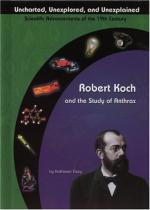|
This section contains 2,087 words (approx. 7 pages at 300 words per page) |

|
World of Microbiology and Immunology on Robert Koch
Robert Koch pioneered principles and techniques in studying bacteria and discovered the specific agents that cause tuberculosis, cholera, and anthrax. For this he is often regarded as a founder of microbiology and public health, aiding legislation and changing prevailing attitudes about hygiene to prevent the spread of various infectious diseases. For his work on tuberculosis, he was awarded the Nobel Prize in 1905.
Robert Heinrich Hermann Koch was born in a small town near Klausthal, Hanover, Germany, to Hermann Koch, an administrator in the local mines, and Mathilde Julie Henriette Biewend, a daughter of a mine inspector. The Kochs had thirteen children, two of whom died in infancy. Robert was the third son. Both parents were industrious and ambitious. Robert's father rose in the ranks of the mining industry, becoming the overseer of all the local mines. His mother passed her love of nature on to Robert who, at...
|
This section contains 2,087 words (approx. 7 pages at 300 words per page) |

|


